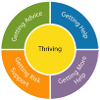
Transforming care
is a national programme led by NHS England which is all about making sure that children and young people with a learning disability, autism or both have the right to the same opportunities as anyone else.
These include:
You can read about how NHS England is doing this nationally here: In St Helens, some of the ways we are doing this is through:
|   |
DSDs and CETRs are central to the NHS Long Term Plan commitments by 2024 to:
- reduce the number of children and adults with a learning disability and autistic children and adults in mental health inpatient services
- avoid inappropriate admissions to mental health inpatient settings
- develop responsive, person-centred services in the community.
St Helens CYP Thrive Offer - Emotional and Mental Wellbeing
In St Helens we have a wide range of services available to support children and young peoples emotional and mental wellbeing in the community as well as in local education settings. Most of the services are available for children and young people aged 0-18 years old, but some offer support for children and young people with SEND up to age 25.
 |  |  |  |  |
A new policy was released in January 2023 which sets out the expectations for the implementation and use of DSDs and CETRs across England; the policy is available here:
Dynamic support register and Care (Education) and Treatment Review Policy and guidance January 2023
It is the responsibility of Integrated Care Boards (ICB) and their delegated directors to ensure its implementation from 1 May 2023.
The DSD enables systems to identify children and young people with increasing and/or complex health and care needs who may require extra support, care and treatment in the community as a safe and effective alternative to admission to a mental health hospital.
Additionally, they play a role in ensuring that people's needs are included in commissioning plans, financial plans, service delivery and development.
DSDs are the mechanism for local systems to:
- use risk stratification to identify people at risk of admission to a mental health hospital
- work together to review the needs of each person registered on the DSD
- mobilise the right support (e.g., a CETR, referral to a keyworker service for children and young people, extra support at home) to help prevent the person being admitted to a mental health hospital.
Care Education and Treatment Reviews
Where children or young people are at risk of a hospital admission a Care Education and Treatment Review (CETR) may be called by the family or professional. When a CETR is called this means that the family and professionals all get together to review the needs and requirements of the young person and decide on the best next steps by working together. A clinical expert and a family member who has had similar experiences from another area will be present to help planning with fresh eyes.
Here is a tool to help planning and understanding of the process; called my Easy Read 'Care and Treatment review'
Annual Health Checks
All people with a learning disability aged 14 and above are entitled to an annual health check. This is usually with the GP or practice nurse.
The annual health check is important because it can help identify any health problems before they get worse, and help adults and young people to receive the care that they need. The Health Check also includes a health plan which will give information on how to say healthy and make recommendations for other referrals if they are needed.
The annual health check is recommended in the SEND Code of Practice guide for health professionals.
NHS England are working to make sure that more people are receiving a health check. If you think you or someone you know should have an annual health check, you can contact your GP surgery to arrange one.
More details about Annual Health Checks can be found here: Mencap - Annual Health Checks
STOMP - Stop Overmedicating
NHS England is leading a campaign to help people understand more about medication for people with learning disabilities. A report in July 2015 found that many people with a learning disability and/ or Autism are being given strong medication when they don't really need it.
These medicines are called 'psychotropics'. Some people are prescribed this medication to try to manage behaviours that challenge. The medication can be very useful for treating mental illness such as psychosis or depression. However there is no evidence that the medicines help stop 'challenging behaviour'.
It is important that you don't stop taking medicines without speaking to your doctor first.
If you are worried about medicines for yourself or someone that you know, you should talk to the person who prescribed them to you and ask for a medication review. This could be your GP, Specialist Doctor, pharmacist or nurse prescriber.




